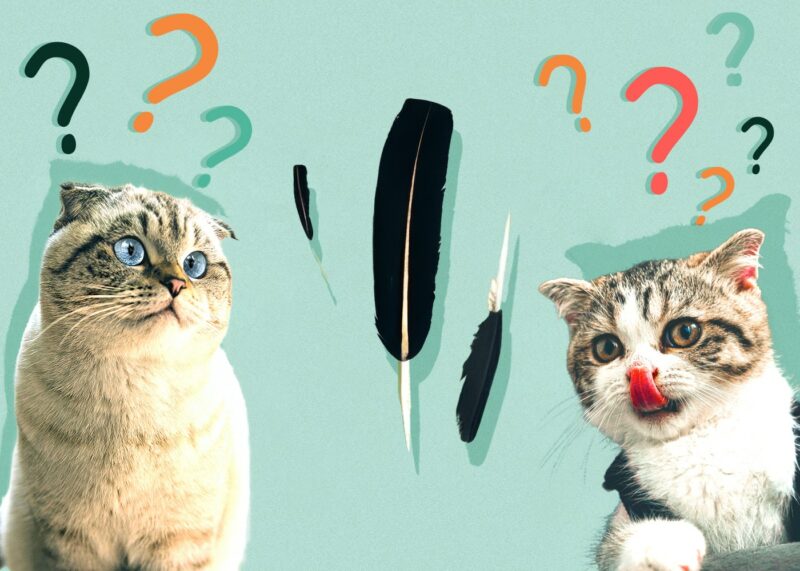Not only are feathers included in a variety of enticing cat toys, but they also cover one of our cat’s favorite prey animals, birds. Whether a poor bird has fallen victim to your cat’s hunting expertise, or you are worried about your kitty swallowing feathers that were attached to a toy, it’s natural to wonder if cats are okay to eat feathers.
The short answer to this question is no, cats cannot eat feathers. Feathers are not healthy for your cat to consume, and they do pose potential health risks, let’s take a look:

Toys with Feathers
Feathers are part of a lot of cat toys, and they provide kitties with stimulation by inducing their predatory instincts. This makes for an exciting playtime! But cats can get quite intense when they are playing, and owners should be aware of the potential dangers that feathers pose if swallowed.
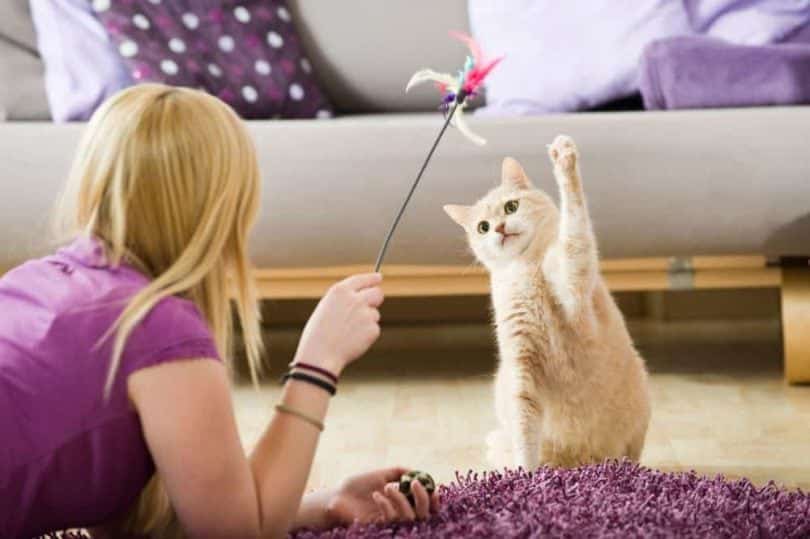
Are Cat Toys with Feathers Safe?
Feathers can pose a potential choking hazard, as they can easily get lodged in your cat’s throat. They are also unable to digest feathers, which could cause more serious problems, such as intestinal blockage as it attempts to pass through their system. Thankfully, feathers on cat toys are made to be soft, not sharp like they are on a live bird, so it’s less likely a cat toy’s feathers would cause lacerations.
This doesn’t mean that cat toys with feathers are not safe overall, but it is best to always supervise their playtime with these toys to ensure no feathers are ingested. If the toy starts to become worn when the pieces become loose, it’s time for a new toy.
It is recommended that you avoid these kinds of toys with kittens, as they tend to use their mouths more during play. Better to be safe than sorry!
What If My Cat Catches a Bird?
Cats are natural-born hunters, and they are not afraid to show it. Many outdoor cats or those that spend time indoors and outdoors, will most likely bring home an unfortunate prey animal at some point. Mice may be the first victims to come to mind, but birds are also a common prey item.
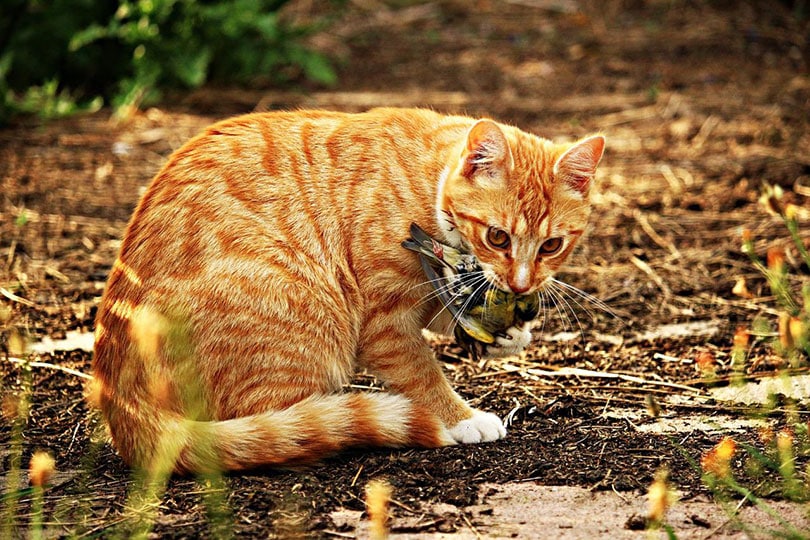
When a bird falls victim to a cat, it tends to be a feathery mess. Most cats will do their best to spit out the feathers, but it is natural for some to be swallowed if your cat chooses to eat the bird they caught. In the wild, it’s completely normal for birds to be consumed. Cats are very methodical with their prey and are driven by instinct.
Normally, swallowing a few feathers from a prey item will not cause any issues, but it is important to keep the risk factors in mind and keep watch for any unusual symptoms they may experience. Make sure to notify your veterinarian immediately if you notice anything out of the ordinary.
Choking
Choking is pretty rare for cats, but it’s best to know the signs and how to handle the situation if it were to ever happen. If an object such as a feather were to become lodged in your cat’s throat and they begin to choke, you need to act quickly to clear their airway, as choking can lead to death very quickly.
Choking will typically cause your cat to panic. If they are conscious, try to keep them as calm as possible, and seek immediate medical attention. If they are unconscious, wrap them in a blanket or towel to prevent injury to you or them. First try opening their mouth, pull their tongue forward, and try to remove the object by hand or with tweezers. If this isn’t possible, you need to perform the proper Heimlich maneuver for cats and contact your veterinarian immediately.
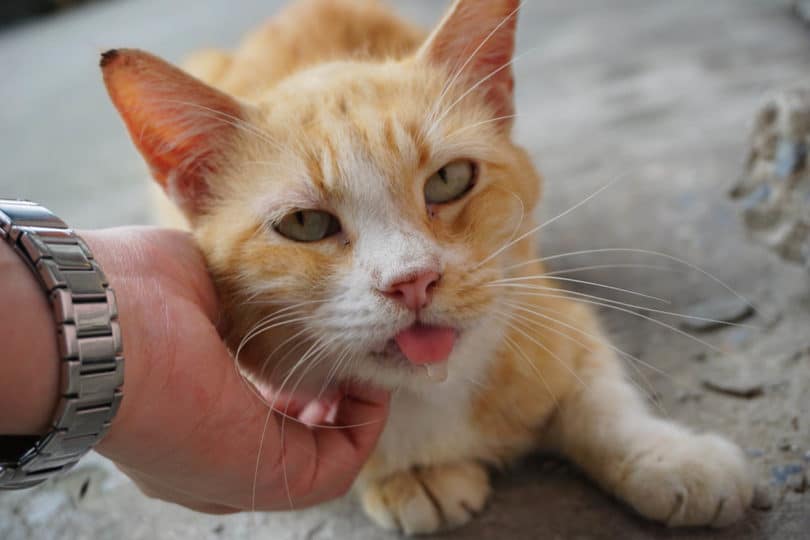
- Heaving with no airway noises
- Labored breathing
- Gagging
- Retching
- Panic and anxiety
- Pawing at the mouth
- Drooling
- Rubbing of face against the ground or floor
Intestinal Obstruction
Intestinal obstruction is considered a medical emergency that will need to be addressed by a veterinarian immediately. Obstructions can be partial or complete and are the result of a cat eating something they are unable to digest. Sometimes, indigestible objects will pass through the system and be excreted in the feces, but there are times an obstruction takes place during the digestive process.
- Vomiting (typically after eating)
- Lack of appetite
- Lack of energy
- Diarrhea
- Weight loss
- Drooling
- Change in behavior
- The appearance of a partial item in the anus (occasionally)
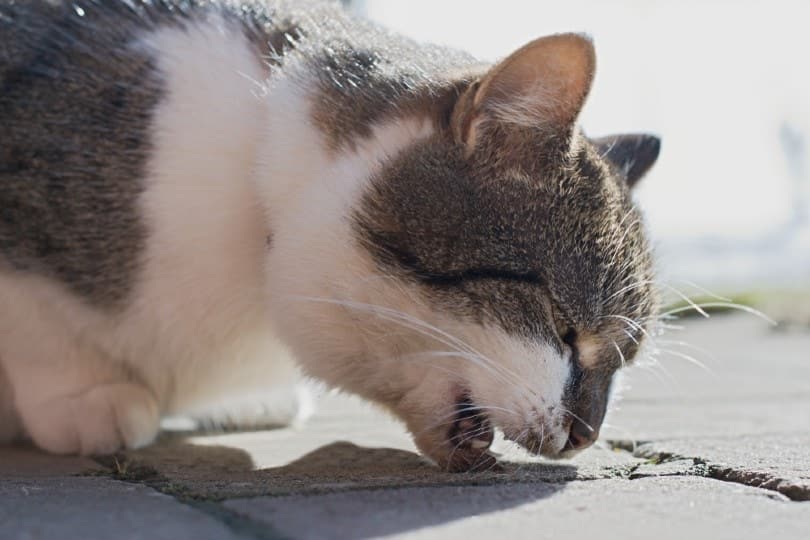

How to Prevent Cats from Hunting Birds
Keeping your cat’s predatory instincts at bay isn’t going to work out too well for you. Our feline friends are natural born, highly effective little hunters. As an owner, it’s your responsibility to take the proper actions that can help you deter and prevent your cat’s hunting behaviors, let’s look:
1. Keep Your Cat Indoors
The most effective way to prevent your cat from hunting birds is by keeping them indoors. It is highly recommended to keep your cat indoors for the sake of their safety as well. Outdoor cats run the risk of getting lost, injured, or even killed when left outside to roam unsupervised. Quite simply, if your cat does not have access to birds, you won’t have a problem.
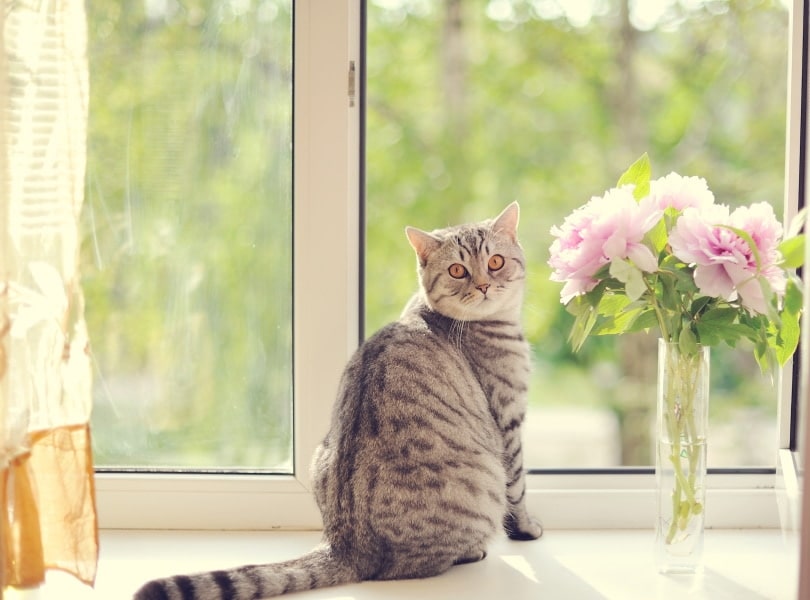
2. Keep Pet Birds Safely Caged
If you have pet birds in addition to pet cats, you are probably aware of the need for extra safety measures to ensure your birds and cats are kept safe. You need to ensure your bird’s cage is inaccessible to your cat(s) and remains securely always closed. If you take your bird out of their cage for some daily exercise, you need to ensure your cat is locked securely in an area away from the bird as they are out and about.
3. Ensure Your Cat is Well-Fed
While hunting is a perfectly natural behavior and cats are opportunistic eaters, you can try to deter their hunting behavior by feeding them a high-quality diet and ensuring all their nutritional needs are met. If they are fed regularly and are at no risk of feeling too hungry, it may prevent them from hunting down unsuspecting birds.
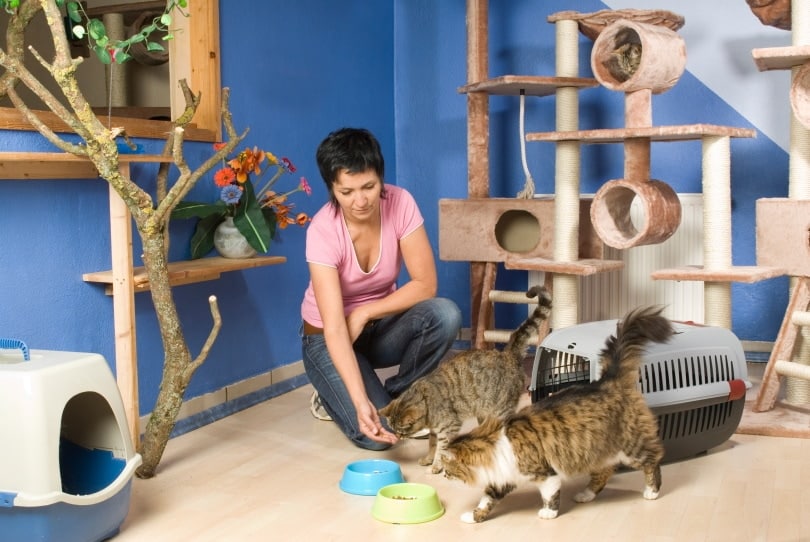
4. Try an In-ground Fence
If you do have an indoor/outdoor kitty, try using an in ground fencing system to keep them from wandering too far out of your yard. While this won’t be much help to birds that make their way into your yard, you’ll drastically cut down the risk of your cat nabbing a bird if they are limited to how far they can roam.
5. Try a Birdbesafe Collar
Birdbesafe collars are large, brightly colored, and made specifically to keep birds safe from cats. These collars work well for birds that can see colors more vividly. It gives them a heads up to a cat’s presence and gives them time to escape before becoming lunch.
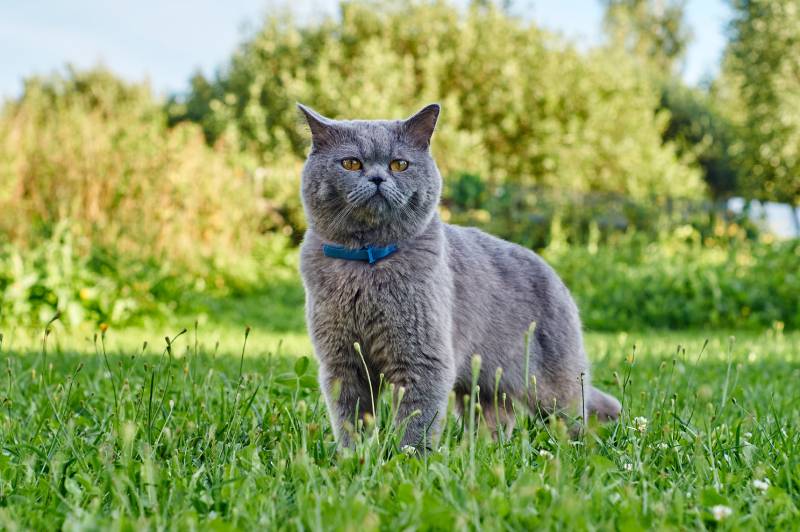

Final Thoughts
Feathers should not be consumed by cats, as they do pose potential health risks such as choking, intestinal obstruction, and the potential for laceration of the mouth or insides if swallowed.
Cats should be supervised during play with feathered toys, and you should wait until they are out of kittenhood before providing these kinds of toys. If you have a hunter or huntress on your hands, you may have to take some steps to help prevent birds from falling victim to your cat, though cats are naturally built to hunt and consume birds.
See also:


